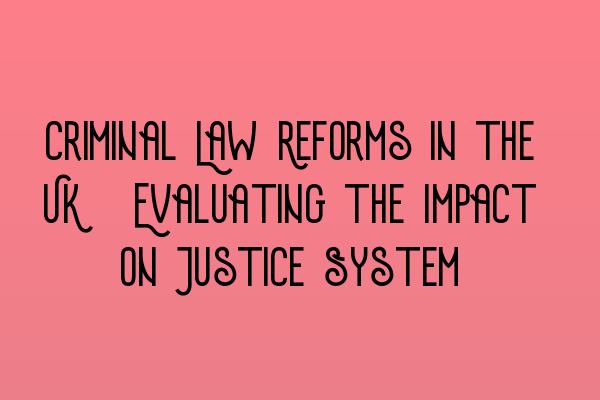Criminal Law Reforms in the UK: Evaluating the Impact on Justice System
The UK’s justice system has undergone significant reforms in recent years, leading to changes in criminal law practices and procedures. These reforms aim to improve the efficiency, fairness, and accessibility of the justice system, ultimately ensuring just outcomes for all parties involved. In this blog post, we will evaluate the impact of these criminal law reforms on the UK justice system.
Reform 1: Introduction of the SQE
One significant reform in the legal profession is the introduction of the Solicitors Qualifying Exam (SQE) by the Solicitors Regulation Authority (SRA). The SQE replaces the traditional route to qualification as a solicitor, providing a more standardized and accessible assessment process. It consists of two stages, SQE1 and SQE2, which evaluate both theoretical knowledge and practical skills.
The SQE1 assesses legal knowledge through multiple-choice questions. To prepare for this exam, candidates can benefit from SQE 1 Practice Exam Questions. These practice questions help candidates familiarize themselves with the exam format and improve their knowledge retention. It is crucial to practice regularly to increase the chances of success.
After passing SQE1, candidates move on to SQE2, which includes practical legal skills assessments. SQE 2 Preparation Courses provide candidates with comprehensive training and guidance for this stage. These courses cover various legal practice areas, ensuring candidates are well-prepared for the practical assessments.
Reform 2: Enhancements in Criminal Law Procedures
The criminal justice system has also witnessed reforms aimed at enhancing criminal law procedures. These reforms focus on improving transparency, efficiency, and access to justice. One example is the digitization of case management systems, which allows for streamlined information sharing and reduces paperwork.
Additionally, the reforms have promoted alternative dispute resolution methods, such as mediation and arbitration, to expedite the resolution of criminal cases. This approach can result in quicker and less costly outcomes, benefiting both the accused and the victims.
Reform 3: Examining the Impact on Justice System
The evaluation of the impact of criminal law reforms is a complex task. However, it is crucial to ensure that these reforms achieve their intended goals without compromising the principles of justice and fairness.
One key aspect to assess is whether the reforms have led to increased access to justice for all individuals, irrespective of their socio-economic background. The reforms should create a level playing field, ensuring that everyone has equal opportunities to present their case and seek justice.
Furthermore, the reforms should also aim to reduce delays in the criminal justice system. Efficient case management, backed by technology advancements, can significantly contribute to expediting proceedings and reducing the burden on courts and legal professionals. Implementing the reforms successfully requires adequate training and support for legal practitioners.
As the criminal law reforms continue to shape the UK justice system, it is crucial to regularly evaluate their impact and address any shortcomings along the way. Striking the balance between efficiency and fairness is paramount to maintain public trust in the justice system.
For more information about the SQE and its preparation, you can read the following related articles:
- SQE 1 Practice Exam Questions
- SQE 1 Practice Mocks FLK1 FLK2
- SQE 2 Preparation Courses
- SQE 1 Preparation Courses
- SRA SQE Exam Dates
At SQE Criminal Law & Practice Law UK, we stay up to date with the latest reforms and ensure our solicitors are well-equipped to navigate the evolving legal landscape. Our team of experts is committed to providing exceptional legal services while upholding the highest standards of professionalism and integrity.
For reliable legal representation and advice, contact SQE Criminal Law & Practice Law UK today.
